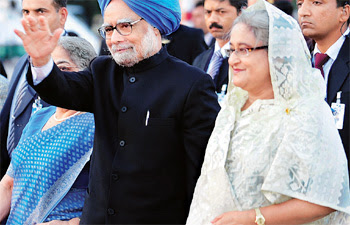Thursday, 8 September 2011
PM Manmohan Singh applauds Sheikh Hasina govt's war on terror Live
Prime Minister Manmohan Singh on Wednesday praised the Sheikh Hasina government in Bangladesh for cracking down on terrorists and militants who were constantly targeting India from its soil.
"I would like to acknowledge the immense cooperation India has received from Bangladesh in this area, which is in the interest of both India and Bangladesh," Singh told the senior ministers, MPs and academicians of Bangladesh at Dhaka University.
Minutes before his lecture, a blast rocked the high court in Delhi - killing 11 people and maiming 76. Hours later, the Harkatul-Jehadi-Islami (HuJI) militant group - an al- Qaeda affiliate with bases in Bangladesh - sent an email claiming responsibility. Ilyas Kashmiri, who the US authorities believe was recently killed in Pakistan, was the head of the HuJI and a senior al-Qaeda member.
Pointing out the need to strengthen counter-terror cooperation, Singh said: "Both India and Bangladesh are vulnerable to the forces of extremism and terrorism. Such forces sap the strength of our societies, threaten our state systems and impede our social and economic progress. It is therefore of paramount importance that we work together." This explains the current level of security cooperation between the two countries. The issue had figured in Tuesday's discussion and Dhaka is currently expediting the legal process to hand over Ulfa general secretary Anup Chetia.
India's ties with Bangladesh had touched a new low between 2001 and 2006 - when the BNPJamaat coalition was in power - over the rise in extremism and anti- India terror conspiracy.
Hasina's return to power saw immediate action on these fronts.
Emphasising on Bangladesh's liberal ideology, the PM said: "Bangladesh has firmly rejected extremist ideas and achieved success as an open and moderate society and democracy. India and Bangladesh share these values." The PM's assertion on counterterror cooperation from a neighbour is significant, keeping in mind India's frustration over its western neighbour Pakistan's inaction on the terror infrastructure and the perpetrators of 26/ 11.
A day after disappointment crept in Bangladesh circles over the delay in signing of the Teesta deal, the PM expressed determination to do so in the near future. "I was hopeful… we would be able to come to an agreement. Both sides worked very hard for a solution.
Unfortunately, the efforts did not meet with success. I have asked all officials to intensify their efforts," the PM said, assuring that India will not take steps that will adversely impact the neighbouring country.
A Bangladeshi daily, meanwhile, described West Bengal CM Mamata Banerjee's absence from the Indian delegation as "an insult to the Indian PM". Mamata refused to accompany the PM in protest against the final draft of the Teesta agreement.
The Daily Star editorial said: "Mamata Banerjee's action amounts to a big let-down for Bangladesh and is an insult to the Indian Prime Minister." There were, however, some takeaways from the PM's visit - the two sides decided to conclude an extradition treaty in the near future. A joint statement issued on Wednesday after PM Singh left Dhaka said, "Bangladesh and India will conclude the extradition treaty expeditiously to complete the legal framework for bilateral security cooperation". The deal is likely to speed up the process for handing over Ulfa leaders.
Bangladesh had earlier dragged its feet on signing such a treaty.
Subscribe to:
Post Comments (Atom)

No comments:
Post a Comment